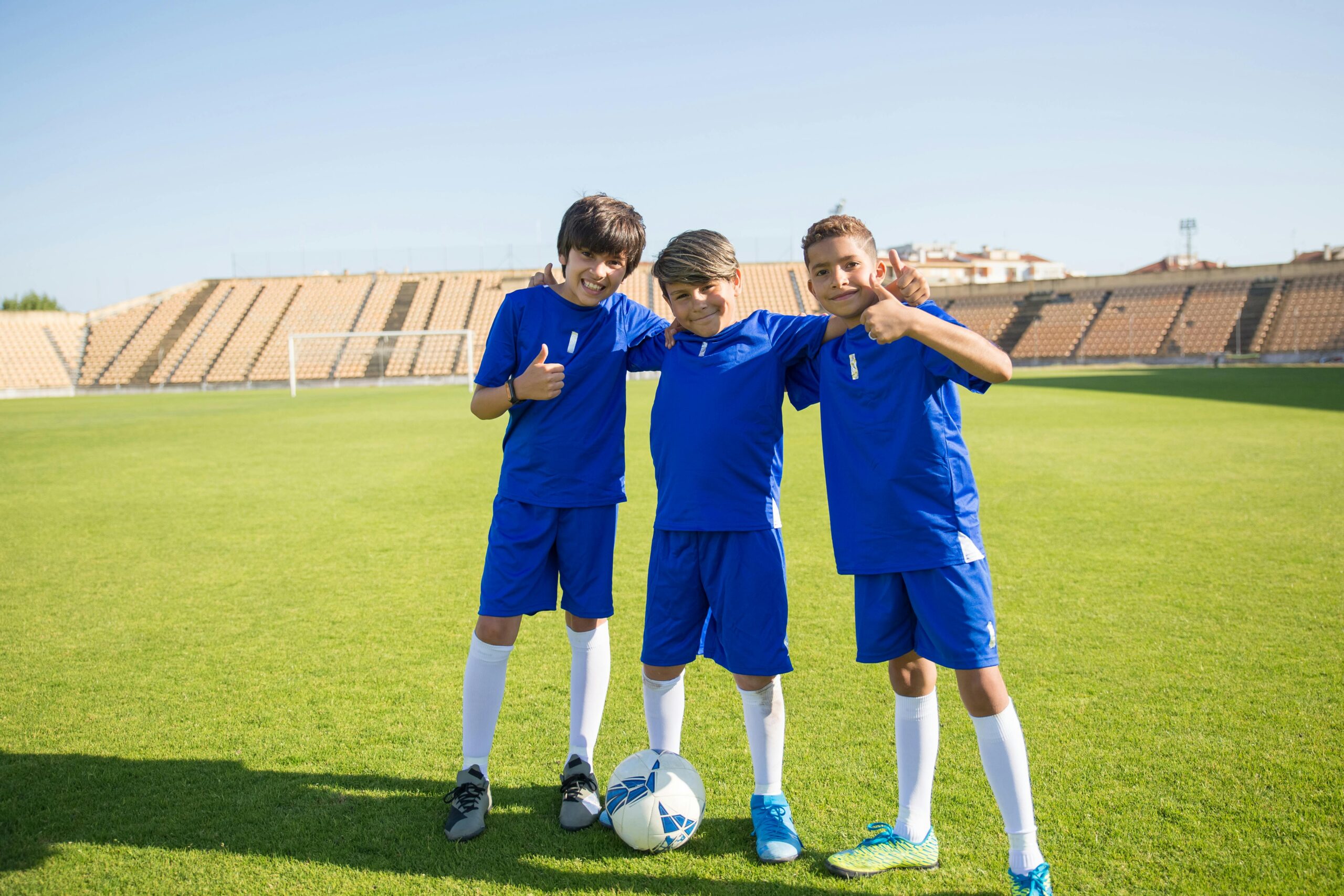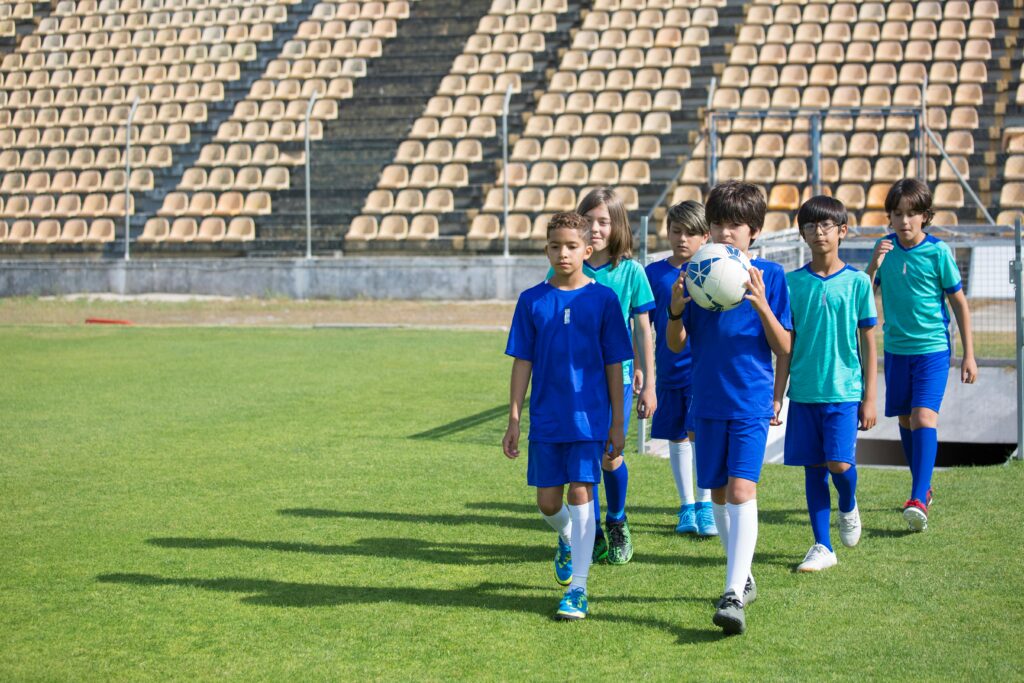Team sports are more than just a way for kids to stay active—they’re a powerful tool for shaping character, building confidence, and nurturing leadership skills. Through collaboration, competition, and perseverance, children who participate in team sports develop qualities that benefit them both on and off the field.
From learning to trust teammates to stepping up in challenging moments, team sports provide a unique environment where kids can grow into confident leaders. Let’s explore the 10 ways team sports build leadership and confidence in kids and why every child can benefit from participating.

1. Developing Communication Skills
Effective communication is at the heart of any successful team, and team sports teach kids how to express themselves clearly and constructively. Whether it’s calling plays, offering encouragement, or resolving conflicts, children learn to communicate with teammates, coaches, and opponents.
How It Builds Confidence
When kids see their ideas and input valued, it boosts their self-esteem and reinforces their ability to contribute meaningfully in group settings.
Leadership in Action
Team captains often model communication skills, demonstrating how to lead discussions and motivate others during games and practice sessions.
2. Encouraging Teamwork and Collaboration
Team sports require children to work together toward a common goal. This teaches them the importance of collaboration, understanding different perspectives, and valuing each teammate’s contributions.
How It Builds Confidence
When kids see their efforts contributing to the team’s success, they feel a sense of accomplishment that reinforces their self-worth.
Leadership in Action
Collaborative sports encourage kids to step up as problem-solvers, helping their team adapt strategies and overcome challenges.
3. Teaching Accountability
In team sports, every player has a role and responsibility. Whether it’s showing up to practice on time, staying focused during games, or learning from mistakes, kids learn the importance of being accountable for their actions.
How It Builds Confidence
Knowing they can take responsibility and improve fosters a sense of control and empowerment in children.
Leadership in Action
Accountable players often inspire their teammates to take ownership of their performance, creating a culture of trust and reliability.
4. Boosting Problem-Solving Skills
Sports are filled with split-second decisions and complex challenges. From adapting to an opponent’s strategy to finding creative ways to score, kids develop critical thinking and problem-solving skills.
How It Builds Confidence
Successfully solving problems on the field translates into confidence in their ability to tackle challenges in other areas of life.
Leadership in Action
Leaders in team sports analyze situations and guide their teammates toward effective solutions, building trust and respect.
5. Fostering Resilience Through Challenges
Team sports teach kids how to handle setbacks, whether it’s losing a game, facing tough competition, or dealing with injuries. These experiences build resilience and a growth mindset.
How It Builds Confidence
Overcoming challenges helps kids realize that setbacks are temporary and that effort and perseverance lead to improvement.
Leadership in Action
Resilient players often encourage their teammates to stay positive and keep striving, even in difficult situations.
6. Enhancing Decision-Making Abilities
Fast-paced team sports like basketball or soccer require players to make decisions quickly and under pressure. Kids learn to analyze situations, weigh options, and act decisively.
How It Builds Confidence
The ability to make quick, effective decisions boosts self-assurance and reinforces trust in their instincts.
Leadership in Action
Strong leaders on the team often take charge in high-pressure moments, guiding their teammates toward success.
7. Building Empathy and Emotional Intelligence
Team sports expose kids to diverse teammates and opponents, teaching them empathy and emotional intelligence. They learn to understand and respect different perspectives, emotions, and backgrounds.
How It Builds Confidence
Empathy helps kids navigate social interactions with ease, fostering positive relationships that boost their confidence.
Leadership in Action
Emotionally intelligent leaders support their teammates emotionally, creating an environment of trust and camaraderie.
8. Instilling a Sense of Responsibility
Playing on a team means being part of something bigger than oneself. Kids learn to take responsibility for their role in the team’s success, as well as their individual performance.
How It Builds Confidence
Being trusted with responsibilities makes kids feel capable and valued, strengthening their self-esteem.
Leadership in Action
Leaders on the team often set examples by taking responsibility for both successes and setbacks, inspiring others to do the same.
9. Celebrating Wins and Learning from Losses
Team sports offer a balanced mix of wins and losses, teaching kids how to celebrate success and handle defeat with grace. These moments provide valuable life lessons about humility and perseverance.
How It Builds Confidence
Experiencing success reinforces self-belief, while learning from losses builds resilience and adaptability.
Leadership in Action
Great leaders help their team celebrate victories without arrogance and analyze losses constructively, fostering growth and unity.
10. Inspiring Leadership Through Role Models
Coaches, team captains, and seasoned players often serve as role models, demonstrating what effective leadership looks like. Kids observe and emulate these behaviors, developing their own leadership styles.
How It Builds Confidence
Seeing role models succeed inspires kids to believe in their own potential and take initiative.
Leadership in Action
Young players who step up to mentor or guide others often become natural leaders, gaining confidence in their ability to lead by example.

Why Team Sports Matter for Kids’ Development
Participating in team sports goes beyond athletic performance—it shapes a child’s character, builds life skills, and prepares them for future challenges. The lessons learned on the field, court, or rink translate into school, social settings, and eventually, professional environments.
Through teamwork, accountability, and resilience, kids not only grow as athletes but also as confident, capable individuals. Parents and coaches play a crucial role in fostering these values, ensuring kids reap the full benefits of their sports experience.
Conclusion
Team sports build leadership and confidence in kids by teaching them essential life skills such as communication, resilience, and empathy. These experiences help them develop into well-rounded individuals who are prepared to lead, inspire, and succeed in all areas of life.
Whether it’s soccer, basketball, or volleyball, encouraging kids to participate in team sports provides a foundation for lifelong growth. The lessons they learn on the field will shape their future, instilling confidence and leadership skills that last a lifetime.



